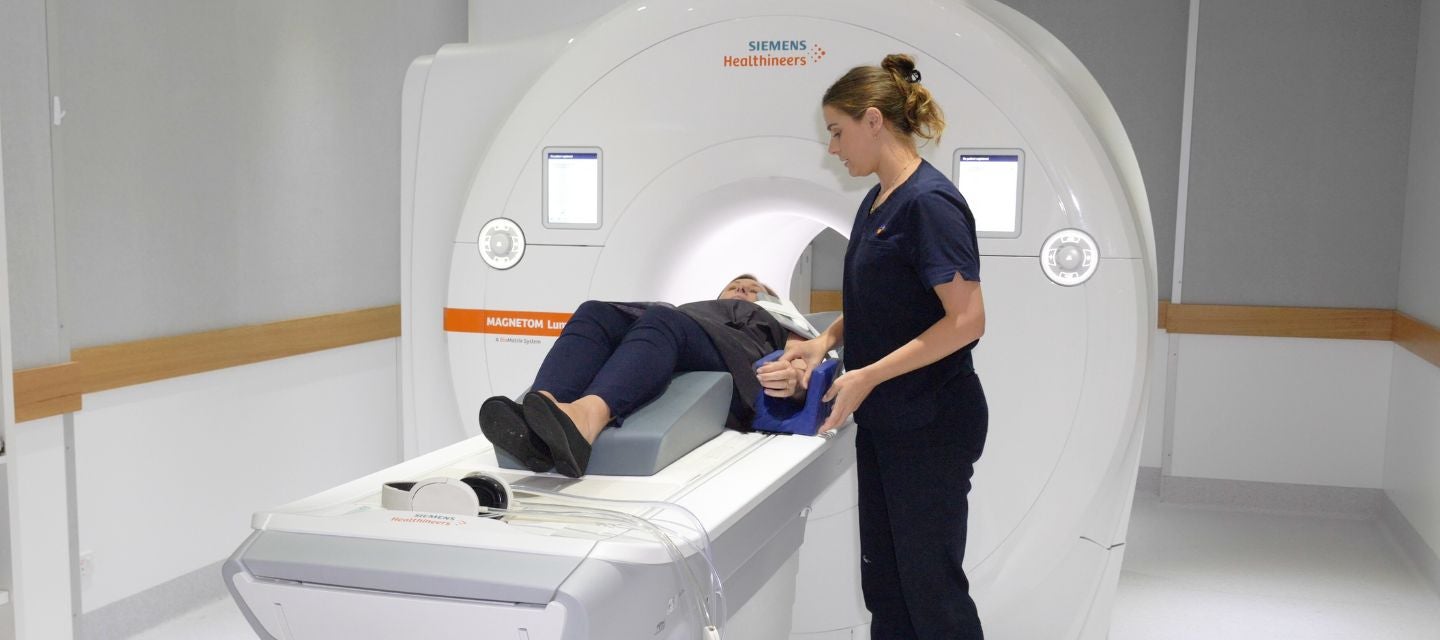
MRI
MRI

Why would my doctor refer me to have an MRI?
Doctors may refer an MRI to assist with the diagnosis and treatment of many injuries and illnesses.
It may be preferred over other types of imaging because it:
- can be very useful in detecting/diagnosing conditions such as damaged ligaments, joint and spinal injuries, and tumours of internal organs/gland (such as the brain, liver, prostate and breast)
- produces high-resolution pictures of soft tissue such as organs and muscles that don’t show up on x-rays
- carries no radiation exposure risk, like in X-rays, PET and CTs.
How much will my examination cost?
Fees for radiology tests can vary and depend on a number of factors. Please make an enquiry with us by phone or email to get a quote for the service you require. ACC co-payments may apply.
We accept all radiology referral forms.
Waikato
Phone: 0800 426 723
Email: Booking.Waikato@i-med.co.nz
Rotorua
Phone: 0800 466 5642
Email: Booking.Rotorua@i-med.co.nz
Bay of Plenty
Phone: 07 544 5993
Email: Booking.bop@i-med.co.nz
Taranaki
Phone: 06 759 4317
Email: Booking.Taranaki@i-med.co.nz
How do I prepare for an MRI? keyboard_arrow_down
Safety precautions
Safety is paramount in the MRI scanner due to strong magnetic fields that can attract and interfere with metal objects, including electronic and magnetic devices. Potential harm or even death may result from these interactions. To ensure safety, a comprehensive safety questionnaire must be completed before or during the appointment.
Implants & medical conditions
Disclosing the presence of pacemakers, implants, and other medical conditions is crucial. Certain objects in the body, such as pacemakers, aneurysm clips, and neurostimulators, can cause harm or be damaged during an MRI. Proper identification of these implants is necessary for a safe scan. It's important to inform our clinic about any implants, as alternative tests may need to be arranged.
Implant documentation
Bringing documents about implants to the appointment is essential for accurate identification. Some implants, particularly newer devices, might be safe for an MRI but need proper recognition. This information ensures a thorough assessment of safety before proceeding with the scan. Additionally, notifying staff about drug patches or metallic tattoos in sensitive areas is crucial.
Personal items & attire:
When entering the scan room, personal items like watches, jewellery, mobile phones, belts, safety pins, hairpins, and credit cards are not allowed. It is advisable to avoid wearing makeup or hairspray containing metal particles to prevent interference with the scan. These precautions help avoid potential heating of the area and, in rare cases, skin burns.
Other Considerations
- Pregnancy should be disclosed to your doctor and the radiology clinic before an MRI scan.
- For individuals with claustrophobia concerns, it is advisable to inform your treating doctor or clinic during the appointment scheduling.
- Specific MRI procedures may require fasting, and patients will be advised accordingly. It is important to continue taking normal medications unless advised otherwise during the booking process.
- Bringing previous X-ray, CT, or ultrasound films is recommended, as the radiologist may want to review older studies or assess changes in the condition since the last scan.
- Arrive about 15 minutes early for your scan. This will give our staff time to fully explain the scan to you, and answer any questions or concerns you may have.
What happens during an MRI scan? keyboard_arrow_down
You will usually be asked to change into a gown to avoid items in your pockets being accidentally taken into the scan room. You will be asked to lie on the scan table and given a buzzer to hold. When you squeeze it, an alarm sounds in the control room and you will be able to talk to the radiographer.
The MRI scanner is very noisy during the scans. It is at a noise level that can damage your hearing. You will be given earplugs or headphones to reduce the noise to safe levels.
Depending on the type of MRI you are having and your particular situation, you might have:
- leads placed on your chest to monitor your heartbeat if having a heart scan
- a small plastic tube (pulsoximeter) taped on your finger to check your breathing and heart rate if having sedative (calming) medication
- a needle inserted into a vein in your arm if any medication is required during the scan
The most common medication injected is called Gadolinium contrast medium (contrast). This highlights the part of the body being scanned, which can give more information to the radiologist who is assessing your problem.
The part of your body to be scanned will be carefully positioned and gently secured, so you are comfortable and more likely to remain still. Special antennae (coils) will be positioned around it to pick up signals from your body so the computer can create images. The coils are usually encased in a plastic pad or frame. Depending on the part of the body being scanned, they might be wrapped around your shoulder or lie on top of your stomach. Some coils are in the mattress of the scan bed, used when your back is being scanned.
To ensure the quality of the images captured, it is very important to be still.
The scan table will then move into the centre of the machine. Your head might be inside or outside the scanner, depending on the part of the body being scanned.
When the scan begins, you will hear a knocking noise that continues during each scan. Scanning is not continuous, and each scan varies in length from about one to several minutes, with a break in between. You will be able to talk to the radiographer between each scan and can press the buzzer if you are not comfortable or want to come out of the machine at any time.
The scanning process is painless. You might feel warm during scanning. If you do feel anything at all, it is important you tell the radiographer.
You need to lie still and hold your position during the scan. In general, you can breathe normally, but occasionally, during some types of MRI, you will need to hold your breath. Breathing and movement can make the images blurry and assessment of your problem more difficult. The radiographer is there to ensure that the scan is carried out safely and correctly, to get the highest quality images. However they won’t be able to advise you of the result, as your images need to be assessed by the Radiologist (specialist doctor) who will provide a written report.
How long does an MRI take? keyboard_arrow_down
The whole scan can last between 20 and 45 minutes.
What are the risks of an MRI? keyboard_arrow_down
There are no known side-effects of an MRI, providing you do not have any implants or objects that must not go in the scanner.
The danger from the MRI is due to interactions of objects with magnetic fields.
Metal objects can move, as well as get hot, and electrical currents can be produced and lead to malfunction of a device. A strong magnet can alter or wipe information from other magnetic devices. Some of these interactions can cause harm or death. Metal objects that are attracted to magnets can be pulled rapidly, like a missile, into the MRI machine. These can damage the machine, as well as injure anyone in the way. Other metal in your body might move if not well fixed.
These would include metal fragments in your eyes, which can interfere with vision if they move in the MRI, and magnetic dental implants. Most implants (hip replacements for example) are well fixed, and are usually made of non-magnetic or only weakly magnetic materials and are not a problem. Clips in the brain, used on an aneurysm, must be non-magnetic or they cannot be scanned. Some catheters (fine tubes usually in your blood vessels) can also melt if they contain a wire.
If you are pregnant, please tell our clinic staff before your procedure. This will not necessarily stop you from having the scan. There are no reported effects of an MRI on the unborn child, but caution is always used in pregnancy.
If you are required to have an injection of contrast, there is a very small risk of an allergic reaction. Contrast is generally very safe, but as with all medications, allergic reactions can occasionally occur. Our clinic staff will treat you if you have an allergic reaction.
If you have a history of kidney disease, you should have a blood test before the scan to ensure that the contrast can be given safely. Please ask the MRI radiographer if you have any concerns.
How do I get my results? keyboard_arrow_down
Your referring doctor will receive the final scan report, within 7 to 10 days of your appointment. Your referring doctor will give you the results of your scan.

This information has been reviewed & approved by Dr Ronald Shnier (I-MED Chief Medical Officer).

This information has been reviewed & approved by Dr Ronald Shnier (I-MED Chief Medical Officer).
How much will my examination cost?
Fees for radiology tests can vary and depend on a number of factors. Please make an enquiry with us by phone or email to get a quote for the service you require. ACC co-payments may apply.
We accept all radiology referral forms.
Waikato
Phone: 0800 426 723
Email: Booking.Waikato@i-med.co.nz
Rotorua
Phone: 0800 466 5642
Email: Booking.Rotorua@i-med.co.nz
Bay of Plenty
Phone: 07 544 5993
Email: Booking.bop@i-med.co.nz
Taranaki
Phone: 06 759 4317
Email: Booking.Taranaki@i-med.co.nz
